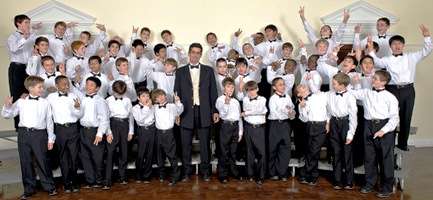|
Back
Those Cosmos Across the Hudson New Jersey
Newark (New Jersey Performing Arts Center)
01/04/2013 - & January 5, 6, 2013
Gustav Holst: The Planets, opus 32
Sir Michael Tippett: Symphony Nr. 4
American Boychoir, Fernando Malvar-Ruiz (Director), New Jersey Symphony Orchestra, Jacques Lacombe (Music Director/Conductor)

J. Lacombe (© Fred Stucker)
Gustav Holst’s seven-movements of The Planets last night was missing one faraway body in our galaxy. Not the planet Pluto–which was discovered after Holst’s century-old work, and then rudely spurned as “not legit.” Rather, it was–to us New Yorkers who casually voyage to Paris, Rome, Istanbul and Luang Prabang–=the planet “New Jersey.”
We all know the name New Jersey, we recognize inhabitants with exotic names like Springsteen, Stewart, the Sopranos, Christie and Bon Jovi. But to actually travel beyond the cumulus of galaxies to reach the Newark’s Elysian Fields, the site of last night’s concert, was well past beyond Gotham-ic reason.
Except that the exuberant personality and conducting prowess of their Quebec-born conductor had reached even the shores of Manhattan. The chance to hear Sir Michael Tippett’s Fourth Symphony live, and curiosity about the 90-year-old New Jersey Symphony Orchestra (NJSY) itself was enough to lure this writer to Newark’s fabled shores.
Yet there additional assets The NJSY is not an “international” orchestra like the New York Phil, but it is more accomplished than any civic orchestra has the right to be. To tackle those impossible brass sections of the Tippett Symphony would tax any group. To sit in the spacious auditorium of the New Jersey Performing Arts Center was a pleasure (albeit with the same blasé middle-class aging audiences).
More important, the program–sub-titled “Air and Atmosphere”– denoted more than music. The lobby exhibited environmental material from the Newark Museum. And two panel discussions during January would tackle the same environment challenges which Holst and Tippett tacked (if unconsciously) in their two works.
These were the evening’s essences. Sir Michael Tippett, a composer for and about the diversity of the human spirit, obliquely created birth to death in his Symphony. Gustav Holst, enchanted by both Indian and ancient Western mysticism, gave us the moods of the galaxies. And together, Jacques Lacombe had the chance to generate our Inner and Outer Cosmos on one program.
The New Jersey Symphony Orchestra has the right players to do the trick. Certainly for the Tippett Fourth, each consort could be heard to do remarkably well. The work can be confusing at first hearing–and conductor Lacombe did a splendid job in giving a general introduction for the audience, which presumably had not heard it before.
But as it went on, even the less attuned were quickly oriented into those marvelous horns of the NJSO, which initially punctuated each section, then would rise with explosive force as Tippett worked into hero-less heldenleben. Yet or all its exuberance, the NJSO turned out most elegantly in the slower section for oboe and English horn. And after that, with the most delicate sensitive sections for percussion, namely the four or vibraphone/xylophone sections.
One could say, as played here by an extended percussion section.–the program listed only a pair of percussionists–that it was like Bartók’s night music, except that the sounds were not for nature imitation, but to accent that pulsing driving life cycle.
Or in another sense, Sir Michael was writing with mallets towards none.
As for the first and final breaths, Jacques Lacombe improved the original. When Sir Michael wrote this in 1977, he “cheated” with a wind machine for the first and last breaths. This time, it was a synthesized breath sound on tape. Methinks the British conductor would have approved.

American Boychoir (© American Boyschoir)
Mr. Lacombe made another change for the finale of Holst’s Planets. Instead of the chorus of offstage women, he used New Jersey’s own American Boychoir. Their voices in that tricky last section were haunting (and unexpected for the majority of the audience, which seemed baffled).
The opening Mars was not really bloodthirsty, but it was good playing, again by the brass. (If I had my druthers as conductor, I would eliminate the very last consonant note of Mars and leave it hanging with those dissonant final chords. But Holst, for all this imagination, was an Edwardian at heart.)
The rest of it went like clockwork, with Jupiter playing those English tunes, any one of which could have supplanted Elgar’s Pomp and Circumstance. The more one listens, the more one realizes that Holst was that rare breed of English composer who, like Tippett, understood the orchestra not as a tool of composition ideas but an idea in itself.
Mr. Lacombe understood this, obviously, and placing these two works together showed the same creative imagination that he infuses in his orchestra.
Harry Rolnick
|